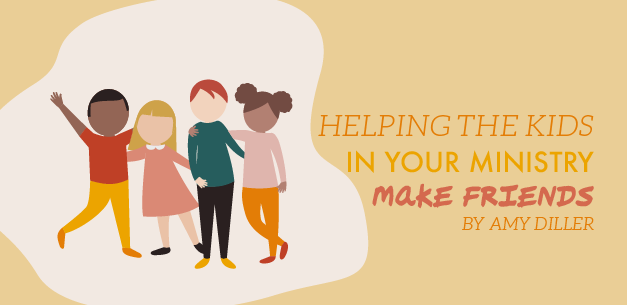Faith-Filled Friendships: Helping the Kids in Your Ministry Make Friends
by Amy Diller
I remember when I was in fourth grade and attending a new church. I knew some kids there, but none of them were my age. Out of all the other kids, there was one in the same grade. Not really knowing much about each other, neither of us was drawn to one another. And then our children’s leader put us together to help the younger kids. We found common ground and grew to become best friends. What we weren’t able to see at first, our leader saw – the potential for friendship. Forty years later, we are still friends and keep in touch regularly.
In children’s ministry, everything builds on relationships. You point kids toward a living and growing relationship with the Lord. You foster relationships with the children and parents you serve. And you can also play a role in nurturing peer relationships. As much as adults need to be part of a community of believers, children do, too. They need to know that their leaders are invested in them, but they also need to be surrounded by friends who love Jesus. That’s not always easy to do when there’s a limited amount of time kids spend at church. This is where you and your volunteers come in – creating an environment for children to form genuine friendships. Not every pair of kids you help connect will become best friends, but there are things you can do to help them get to know one another better.
Provide Time
You may feel pressure during service times to pack every moment to the brim with lesson-focused activities. After all, you only have so much time with the kids each week. It’s not wrong to make everything about the lesson, but it can leave little margin for children to form friendships. Kids need other kids who follow Jesus in their lives. Providing time for them to get to know one another is important. Planned activities with peer interaction can offer part, but not all, of it. Children need free time for relationships to grow organically. Instead of viewing free time as something you do only when your lesson runs short, purposely schedule it. Building relationships between peers and between kids and leaders is important, too. If you think about your own friendships and how they came to be, they likely occurred in those in-between moments, times when you were free to talk and laugh and get to know one another better. When you plan your Sunday morning and midweek routines, provide time for free play allowing kids the opportunity to nurture friendships.
Find Common Bonds
Sharing common bonds naturally draws people together. When kids only see their peers at church once or twice a week at most, difficulties in discovering commonality arise. Encourage your volunteers to become students of the children they serve. Make it a point to pay close attention so you can gather information about their hobbies, pets, schools, sports, and activities. As you get to know the kids better, you not only establish a bond between you and them, but you can also look for common bonds between peers that plant the seeds of potential friendships. Introduce them to one another. Share with kids the areas where they have similar interests with one another. Give them the building blocks needed to get the ball rolling. Plan “getting to know you” activities on a regular basis, too. These don’t have to be lengthy; even a little time hearing bits of information about one another can spark a new friendship.
Teach Friendship
Look for opportunities to talk to the kids in your ministry about qualities of strong relationships – those with the Lord and friends. We all desire relationships but don’t always know what healthy ones look like. As children grow, their understanding of friendship develops, and they learn what it takes to be a good friend and what they should look for in making friends. Find examples in your lessons of positive, God-honoring character traits and highlight them. Point to the Lord’s character as the perfect model for us to learn from. Develop classroom expectations around being respectful, trustworthy, kind, and forgiving. Help them navigate disagreements and solve problems with one another. Let children know when you see them interacting with each other in godly ways by identifying the character trait you observed. Foster relationships between you and the kids, your volunteers, and the parents. Children look to adults in their lives as examples. Offer resources to parents to help guide them in teaching and modeling healthy relationships with their children.
Ecclesiastes 4:9-12 talks about the value of relationships and says,
“Two are better than one, because they have a good return for their labor: If either of them falls down, one can help the other up. But pity anyone who falls and has no one to help them up. Also, if two lie down together, they will keep warm. But how can one keep warm alone? Though one may be overpowered, two can defend themselves. A cord of three strands is not quickly broken.”
The idea is that in friendships, we have the chance to help one another and be better together. In the book of Romans, Paul writes, “I long to see you so that I may impart to you some spiritual gift to make you strong—that is, that you and I may be mutually encouraged by each other’s faith.” (Romans 1:11-12). Sharing life with a friend who follows Jesus gives kids a chance to build each other up in the faith.
God designed us to be in relationship with one another, and those shared with other Jesus-followers are so important. As children grow and the voice of culture becomes louder, friendships with other Christians are necessary. Taking the time to teach and nurture bonds between the kids in your ministry helps to form these important friendships.

